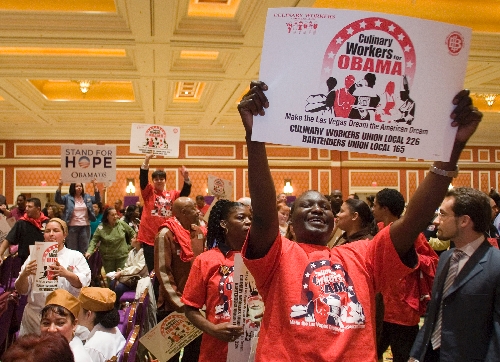Democrats’ plan puts state near front
WASHINGTON -- Nevada would retain a place near the head of the political calendar for Democrats in 2012 under a plan considered at a party rules meeting Friday.
Abandoning the typical January beginning, the Democratic National Committee's Rules and Bylaws panel proposed holding the Iowa caucuses on Feb. 6, 2012, and the New Hampshire primary eight days later, on Feb. 14.
Nevada caucuses would be Feb. 18 and the South Carolina primary on Feb. 28.
All other states would hold their primaries and caucuses after March 6. The calendar must be approved by the full national committee at a meeting later this summer before the changes can go into effect.
In 2008, Nevada enjoyed a national spotlight when it became the first Western state to weigh in on the Democrats' presidential contenders. The state caucuses took place on Jan. 19 that year, following balloting in Iowa and New Hampshire.
Barack Obama emerged with 13 Nevada delegates to the Democratic National Convention, while Hillary Clinton had 12.
Nevada Democrats led by Sen. Harry Reid lobbied heavily to move the state to the top of the calendar. They argued it would demonstrate the party's growing clout in the once-Republican-red West.
Also, they made a case that candidates would have opportunities to measure their appeal to traditional constituencies found among Southern Nevada's union workers and its substantial population of Hispanics.
On Friday, Democrats who gathered in Washington for a two-day session also looked to limit the influence of the independent superdelegates in choosing the party's nominee. Superdelegates are the members of Congress, governors and party elders who can back candidates regardless of how their states vote.
In 2008, Obama won over scores of superdelegates, helping him build an advantage over Clinton in the final count. About a fifth of the delegates to the national convention were superdelegates.
The DNC rules panel moved toward recommending a reduction in the number of superdelegates, from 20 percent of the total number of delegates to 15 percent. At the same time, the panel recommended increasing the overall number of delegates from the current 4,439.
With Obama likely to seek a second term, Democrats were willing to stick with the traditional calendar start, rebuffing complaints from some party officials that Iowa and New Hampshire, predominantly white states with smaller populations, have an oversized role in the process.
Dennis Archer, a rules committee member and a former mayor of Detroit, said Democrats risk losing influence if they don't consider other states for early nominating contests.
"Demographically, America is changing," Archer said. "We've got to stop looking at shortsighted solutions. I'm comfortable keeping it there for 2012, but there ought to be a real discussion that goes to 2016."
The panel recommended harsh penalties for states and candidates who violate the calendar. Candidates cannot win delegates if they campaign in states that try to hold their contests early. States that ignore the rules automatically will be stripped of half their delegates. In 2008, Michigan and Florida were penalized for moving up their primaries.
Some officials said they were willing to consider new states but not now.
"Already planning 2016 before we've succeeded in 2012 seems a little disquieting," said Alice Germond, a committee member from West Virginia.
"Let's do this and do it right. But after we win."
The DNC meets later this summer in St. Louis, one of the four cities Democrats are considering for the national convention.
Republicans are considering the same order of states to nominate their candidate and will finalize their calendar later this summer.
Stephens Washington Bureau Chief Steve Tetreault contributed to this report.

















